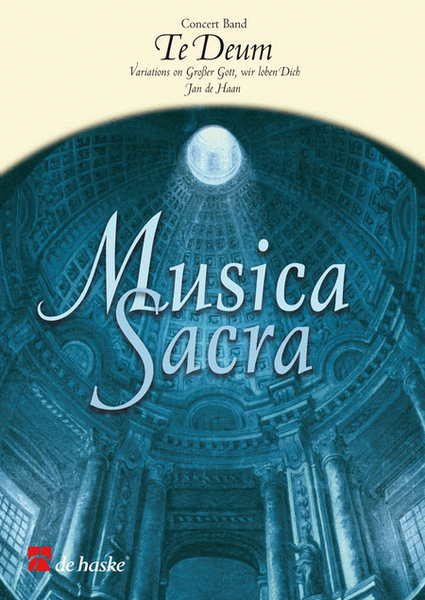Te Deum
Variations on Großer Gott, wir loben Dich
-
Ships in 2 to 3 weeks
Details
Description
SKU: BT.DHP-1094669-140
Variations on Großer Gott, wir loben Dich. Composed by Jan de Haan. Musica Sacra. Concert Piece. Score Only. Composed 2009. 36 pages. De Haske Publications #DHP 1094669-140. Published by De Haske Publications (BT.DHP-1094669-140).9x12 inches. English-German-French-Dutch.
Großer Gott, wir loben dich is a well-known German hymn, written by Ignaz Franz in the 18th century but based on the 4th century Te Deum laudamus. After a radiant introduction by the brass section, the first variation on the chorale appears. Subsequently, the song is rendered in its original form. Then three more variations follow. The result is a solemn work that is very fitting within the context of a church service, but is also suitable for many other occasions.
Grosser Gott, wir loben dich is een bekende traditionele Duitse lofzang die in de 18e eeuw werd geschreven door Ignaz Franz, op basis van het 4e-eeuwse Te Deum laudamus van - waarschijnlijk - Nicetas von Remesiana. Demooie melodie ligt goed in het gehoor. Het is een plechtig werk dat in de context van een kerkdienst goed tot zijn recht komt, maar ook voor diverse andere gelegenheden geschikt is.
Nach einer strahlenden Einleitung der Blechbläser setzt die erste Variation über das bekannte Kirchenlied ein. Danach erscheint das Lied in seiner ursprünglichen Form, gefolgt von drei weiteren Variationen. Das Ganze fügt sich zu einem feierlichen Werk, das sehr gut in einen Gottesdienst passt, sich aber auch für zahlreiche andere Anlässe eignet.
Grosser Gott, wir loben dich (Grand Dieu nous te bénissons) est un célèbre cantique allemand composé au XVIIIe siècle par Ignaz Franz. Sa mélodie est directement inspirée du Te Deum laudamus (IVe siècle), fréquemment attribué Nicetas, évêque de Remesiana. La ligne mélodique est facile suivre.Après une introduction brillante par les cuivres, la première variation sur le choral apparaît. La mélodie du cantique est ensuite interprétée dans sa version originale suivie de trois autres variations. L’œuvre est solennelle et se prête une interprétation dans le cadre d’un office religieux ou en toute autre occasion festive.
Großer Gott, wir loben dich è un celebre cantico tedesco composto nel XVIII secolo da Ignaz Franz. La sua melodia è direttamente ispirata dal Te Deum laudamus (IV secolo) attribuito a Niceta, vescovo di Remesiana. Dopo un’introduzione brillante, appare la prima variazione. In seguito, la melodia del cantico è interpretata nella versione originale seguita da tre altre variazioni. Il brano è solenne e si presta ad una interpretazione in un contesto religioso e in tutte le occasioni festive.

 Share
Share